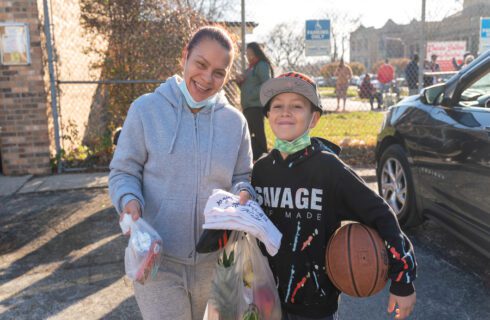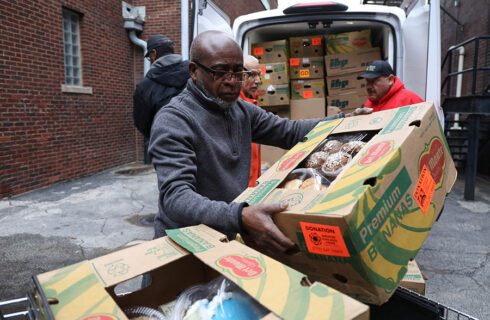After unexpected hardships, Kathleen counts on SNAP and her local food pantry for support
Kathleen’s daughter got pregnant at 16. Three days after her daughter gave birth to her son, Timothy, Kathleen started to care for him. Timothy was born with developmental disorders. When he was seven years old, Kathleen assumed permanent guardianship. “He’s my retirement fund,” Kathleen said. “I poured all of the money I saved into him.” The alternative for Timothy was foster care, which Kathleen would never agree to. “I love my grandson, so I had to take him in,” Kathleen said. “Nobody would give him the care he needs. He would have been overlooked.” Kathleen’s situation is fairly common. According to U.S. Census data, 2.7 million grandparents in the U.S. were raising their grandchildren in 2012. Nearly one-fifth of those households have incomes that fall below the poverty line. Kathleen lives in one of those households.
Kathleen was a horticulturist by trade. She worked for a variety of garden centers and plant retailers throughout the Chicagoland area.
“I retired, but I had no choice,” Kathleen said. “If I could be working, I would be.”
Kathleen’s mobility is limited due to a problem with her leg. She uses a walker and needs help getting down the stairs.
Today, Kathleen and Timothy, 32, live on a fixed income. She receives Social Security and her grandson receives Supplemental Security Income. They also receive Supplemental Nutrition Assistance Program (SNAP) benefits, along with medical support.
Within the past few years, her benefits were cut from $194 to $14, citing that she or Timothy could get a job. She fought to get it back up to $110.
“Even still, $110 in SNAP benefits is a week and a half of groceries at the store, if you really stretch it,” Kathleen said. “By the end of the month, the food stamps are gone, and I have to ask myself, ‘where do I get more money?’”
Kathleen turns to Schaumburg Township Pantry to help fill in the gaps.
“People think SNAP does everything for you,” Kathleen said. “Not even close. Then you have to turn to pantries. It helps immensely, but you still struggle.”
Kathleen says her hurdles don’t just involve her food budget.
“I was denied help for my utilities because my social security check is not low enough,” Kathleen said. “Some months I have to look at the weather and decide, ‘What days do I not run the heat?’ Sometimes I have to sell my things just to have enough money for food. I shouldn’t have to sell what I have worked for just to survive.”
Diana, the director of the Schaumburg Township Pantry, helped Kathleen apply for SNAP and utility assistance.
Kathleen’s situation is fairly common. According to U.S. Census data, 2.7 million grandparents in the U.S. were raising their grandchildren in 2012. Nearly one-fifth of those households have incomes that fall below the poverty line. Kathleen lives in one of those households.
Kathleen was a horticulturist by trade. She worked for a variety of garden centers and plant retailers throughout the Chicagoland area.
“I retired, but I had no choice,” Kathleen said. “If I could be working, I would be.”
Kathleen’s mobility is limited due to a problem with her leg. She uses a walker and needs help getting down the stairs.
Today, Kathleen and Timothy, 32, live on a fixed income. She receives Social Security and her grandson receives Supplemental Security Income. They also receive Supplemental Nutrition Assistance Program (SNAP) benefits, along with medical support.
Within the past few years, her benefits were cut from $194 to $14, citing that she or Timothy could get a job. She fought to get it back up to $110.
“Even still, $110 in SNAP benefits is a week and a half of groceries at the store, if you really stretch it,” Kathleen said. “By the end of the month, the food stamps are gone, and I have to ask myself, ‘where do I get more money?’”
Kathleen turns to Schaumburg Township Pantry to help fill in the gaps.
“People think SNAP does everything for you,” Kathleen said. “Not even close. Then you have to turn to pantries. It helps immensely, but you still struggle.”
Kathleen says her hurdles don’t just involve her food budget.
“I was denied help for my utilities because my social security check is not low enough,” Kathleen said. “Some months I have to look at the weather and decide, ‘What days do I not run the heat?’ Sometimes I have to sell my things just to have enough money for food. I shouldn’t have to sell what I have worked for just to survive.”
Diana, the director of the Schaumburg Township Pantry, helped Kathleen apply for SNAP and utility assistance.
“Without the pantry, I would be on my own in this fight,” Kathleen said. “I have to fight every time I renew my SNAP benefits to show I need the help. It’s not just me who deals with these issues. It’s all the seniors in the neighborhood. This pantry is helping everyone it can.”Kathleen said although her life isn’t what she thought it would be, she doesn’t feel helpless. “I never give up the mentality that we are the voices that make a difference,” Kathleen said. This is why Kathleen thinks it is valuable to share her story. “Nobody sees that it’s not numbers and statistics, it’s people,” Kathleen said. “These are people lining up at food pantries and applying for money to put food on the table. These are real people.”
Share This Post



